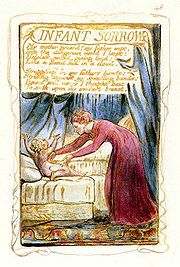
Infant Sorrow
Encyclopedia

William Blake
William Blake was an English poet, painter, and printmaker. Largely unrecognised during his lifetime, Blake is now considered a seminal figure in the history of both the poetry and visual arts of the Romantic Age...
from Songs of Experience.
Poem
Infant SorrowMy mother groan'd! my father wept.
Into the dangerous world I leapt.
Helpless, naked, piping loud;
Like a fiend hid in a cloud.
Struggling in my father's hands,
Striving against my swaddling bands;
Bound and weary I thought best
To sulk upon my mother's breast.
One thing that generally goes unnoticed in this poem is the use of the past tense to describe this birth. The speaker is no longer a baby: he has had some experience of the dangerous world and he turns back to see the dreadful moment when - like a fiend, not like an angel - he came to life. The verb leapt suggests his exhausted mother\'s last push after a painful labour, with no tender arms to take and cuddle this creature. The baby found itself half stifled with the poor bandage wrapped around its tiny body and its father\'s hands to hold him tight. He tried to free himself, as hard as he could, but his attempt was vain and in the end he could only surrender and \"sulk upon ... mother\'s breast\".
The struggle is symbolical of any attempt of contrasting tyrannical oppressive power (the father, the institutions, the church itself...) and the final moment of surrender is the negative acceptance of one\'s destiny.
----
This poem belongs to the "Songs of Experience" by William Blake. It is the counter poem of "Infant Joy". The poem suggests that childbirth is not always joyful and happy but can bring sorrow and pain. The response of the child itself may be different from that of the child in "Infant Joy" because of the behavior of the parents. In this poem the parents seem depressed by this unwanted birth, and this may be reflecting on the child itself.
This poem could be considered as a work of societal allusion. It is well known that William Blake was strongly opposed to the industrial revolution; similarly, he was opposed to the mistreatment of children by rich factory owners. When the infant is being brought helpless and naked to the "dangerous world", this world refers to the industrial revolution. The "swaddling bands" represent the fat that infants are born with, initially to insulate them and provide some form of defense against their inherent vulnerability. Blake utilizes this as a symbol of temporary security. While the child is young, he/she will be nurtured and protected by their parents. But once the child matures, they will find a life devoid of any joy or pleasure, such as working in the factories with no security. The child decides to "sulk" upon the breast of the mother's child, almost in a manner that allows the child to enjoy what little comfort it has left. This poem is powerful in the sense that it outlines the desperate, sorrowful situation facing all ill-mannered children once they begin to grow and become strong machine operators.
----

